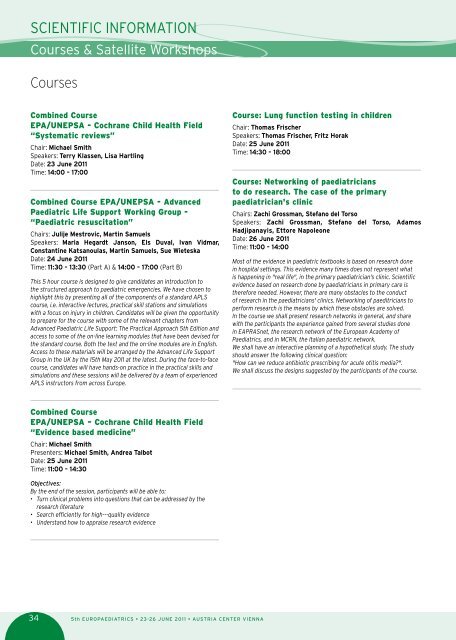2011 Final Programme Booklet
2011 Final Programme Booklet
2011 Final Programme Booklet
Create successful ePaper yourself
Turn your PDF publications into a flip-book with our unique Google optimized e-Paper software.
SCIENTIFIC INFORMATION<br />
Courses & Satellite Workshops<br />
Courses<br />
Combined Course<br />
EPA/UNEPSA - Cochrane Child Health Field<br />
“Systematic reviews”<br />
Chair: Michael Smith<br />
Speakers: Terry Klassen, Lisa Hartling<br />
Date: 23 June <strong>2011</strong><br />
Time: 14:00 – 17:00<br />
Combined Course EPA/UNEPSA - Advanced<br />
Paediatric Life Support Working Group -<br />
“Paediatric resuscitation”<br />
Chairs: Julije Mestrovic, Martin Samuels<br />
Speakers: Maria Hegardt Janson, Els Duval, Ivan Vidmar,<br />
Constantine Katsanoulas, Martin Samuels, Sue Wieteska<br />
Date: 24 June <strong>2011</strong><br />
Time: 11:30 – 13:30 (Part A) & 14:00 – 17:00 (Part B)<br />
This 5 hour course is designed to give candidates an introduction to<br />
the structured approach to paediatric emergencies. We have chosen to<br />
highlight this by presenting all of the components of a standard APLS<br />
course, i.e. interactive lectures, practical skill stations and simulations<br />
with a focus on injury in children. Candidates will be given the opportunity<br />
to prepare for the course with some of the relevant chapters from<br />
Advanced Paediatric Life Support: The Practical Approach 5th Edition and<br />
access to some of the on-line learning modules that have been devised for<br />
the standard course. Both the text and the on-line modules are in English.<br />
Access to these materials will be arranged by the Advanced Life Support<br />
Group in the UK by the 15th May <strong>2011</strong> at the latest. During the face-to-face<br />
course, candidates will have hands-on practice in the practical skills and<br />
simulations and these sessions will be delivered by a team of experienced<br />
APLS instructors from across Europe.<br />
Combined Course<br />
EPA/UNEPSA – Cochrane Child Health Field<br />
“Evidence based medicine”<br />
Chair: Michael Smith<br />
Presenters: Michael Smith, Andrea Talbot<br />
Date: 25 June <strong>2011</strong><br />
Time: 11:00 – 14:30<br />
Objectives:<br />
By the end of the session, participants will be able to:<br />
• Turn clinical problems into questions that can be addressed by the<br />
research literature<br />
• Search efficiently for high---quality evidence<br />
• Understand how to appraise research evidence<br />
34 5th EUROPAEDIATRICS • 23-26 JUNE <strong>2011</strong> • AUSTRIA CENTER VIENNA<br />
Course: Lung function testing in children<br />
Chair: Thomas Frischer<br />
Speakers: Thomas Frischer, Fritz Horak<br />
Date: 25 June <strong>2011</strong><br />
Time: 14:30 – 18:00<br />
Course: Networking of paediatricians<br />
to do research. The case of the primary<br />
paediatrician's clinic<br />
Chairs: Zachi Grossman, Stefano del Torso<br />
Speakers: Zachi Grossman, Stefano del Torso, Adamos<br />
Hadjipanayis, Ettore Napoleone<br />
Date: 26 June <strong>2011</strong><br />
Time: 11:00 – 14:00<br />
Most of the evidence in paediatric textbooks is based on research done<br />
in hospital settings. This evidence many times does not represent what<br />
is happening in "real life", in the primary paediatrician's clinic. Scientific<br />
evidence based on research done by paediatricians in primary care is<br />
therefore needed. However, there are many obstacles to the conduct<br />
of research in the paediatricians' clinics. Networking of paeditricians to<br />
perform research is the means by which these obstacles are solved.<br />
In the course we shall present research networks in general, and share<br />
with the participants the experience gained from several studies done<br />
in EAPRASnet, the research network of the European Academy of<br />
Paediatrics, and in MCRN, the Italian paediatric network.<br />
We shall have an interactive planning of a hypothetical study. The study<br />
should answer the following clinical question:<br />
"How can we reduce antibiotic prescribing for acute otitis media?".<br />
We shall discuss the designs suggested by the participants of the course.


